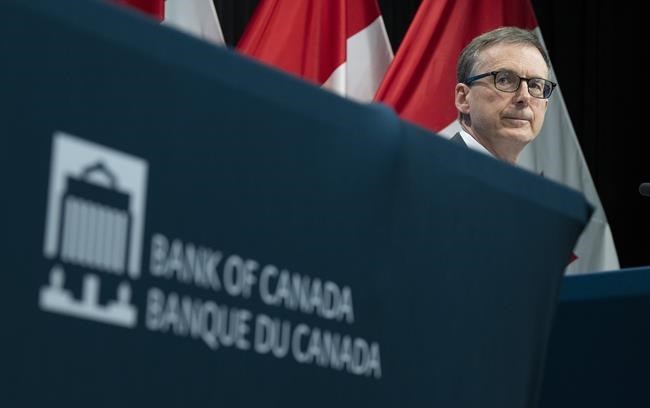OTTAWA — The Bank of Canada hiked its key interest rate by a quarter of a percentage point on Wednesday, bringing it to 4.5 per centand signalling it plans to hold there for now.
The central bank also released its latest economic forecast and said it expects inflation to come down significantly this year, reaching about three per cent by mid-year.
Here's how we got here:
Oct. 24, 2018: The Bank of Canada's key interest rate reached 1.75 per cent after gradually increasing since the 2015 oil price crash that rippled through the Canadian economy. That rate remained unchanged throughout 2019.
March 4, 2020: The Bank of Canada cut its key interest rate by half a percentage point to 1.25 per cent amid economic concerns stemming from COVID-19, just days before the World Health Organization declared a global pandemic.
March 13, 2020: The Bank of Canada announced that it would lower its overnight rate target by another half percentage point to 0.75 per cent, effective March 16, in a rare unscheduled announcement. At the time, the central bank called the decision a "proactive measure" in response to the pandemic worsening, as well as the significant drop in oil prices.
March 27, 2020: The Bank of Canada lowered its key interest rate to 0.25 per cent, a record low, and launched a quantitative easing program (or government bond-buying program) to further stimulate the economy as COVID-19 continued to spread around the world.
Oct. 27, 2021: With the economy showing signs of new life and COVID-19 restrictions lifting, the Bank of Canada announced it was ending its quantitative easing program.
March 2, 2022: After keeping its key interest rate at 0.25 per cent for two years, the Bank of Canada raised it to 0.50 per cent. The move came amid stubbornly high inflation and an increasingly volatile global economic landscape driven by Russia's invasion of Ukraine.
April 13, 2022: The Bank of Canada further hiked its key interest rate by half a percentage point to one per cent. The last time the central bank raised the overnight target rate by half a percentage point rather than a quarter was in May 2000.
June 1, 2022: The Bank of Canada raised its key interest rate by another half of a percentage point to 1.5 per cent — the fastest year-over-year rise in more than three decades, to rein in a higher than expected inflation rate of 6.8 per cent.
July 13, 2022: As projected, another hike came later in the summer as the Bank of Canada raised its key interest rate by a full percentage point to 2.5 per cent, a rare move and the largest single rate hike since August 1998.
Sept. 7, 2022: The Bank of Canada raised its key interest rate three-quarters of a percentage point to 3.25 per cent — the highest key rate since May 2008. After the hike, in an Oct. 6 speech, Bank of Canada governor Tiff Macklem said there was more to be done.
Oct. 26, 2022: The Bank of Canada hiked its key interest rate by half of a percentage point to 3.75 per cent. The central bank said rates would need to rise further to clamp down on decades-high inflation. Earlier in the year, economists were expecting the rate hike cycle to be completed by October.
Dec. 7, 2022: As a year marked by rate hikes drew to a close, the Bank of Canada raised its key rate by another half-percentage point to bring it to 4.25 per cent, the highest since January 2008 and an increase of four percentage points from the start of the year.
Jan. 25, 2023: The Bank of Canada raised its key interest rate by a quarter of a percentage point and said it expects this to be the last rate hike of the cycle as its latest economic forecast points to inflation slowing to three per cent by midyear. The central bank left the door open to further hikes, however, if it is necessary to bring inflation further under control.
This report by The Canadian Press was first published Jan. 25, 2022.
The Canadian Press



